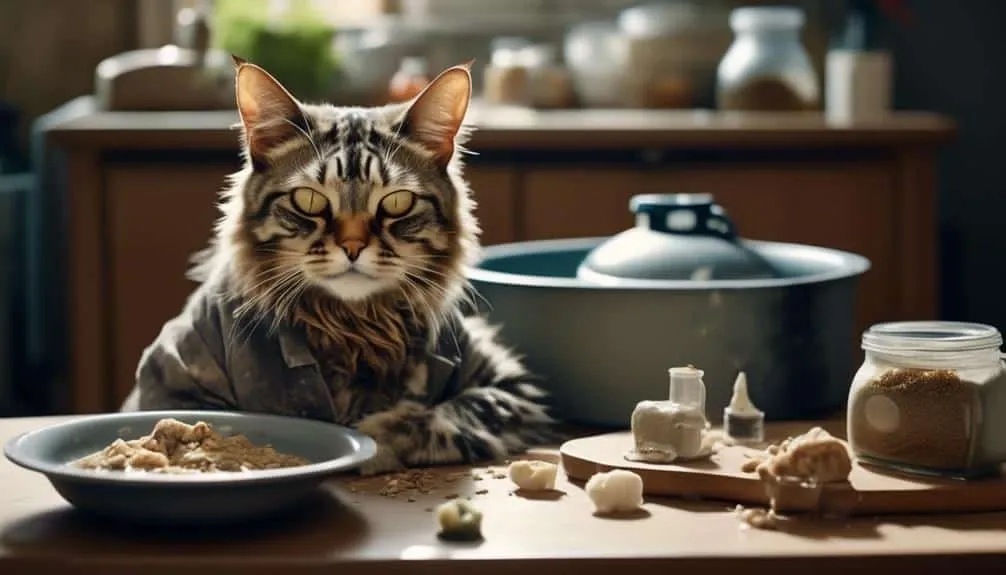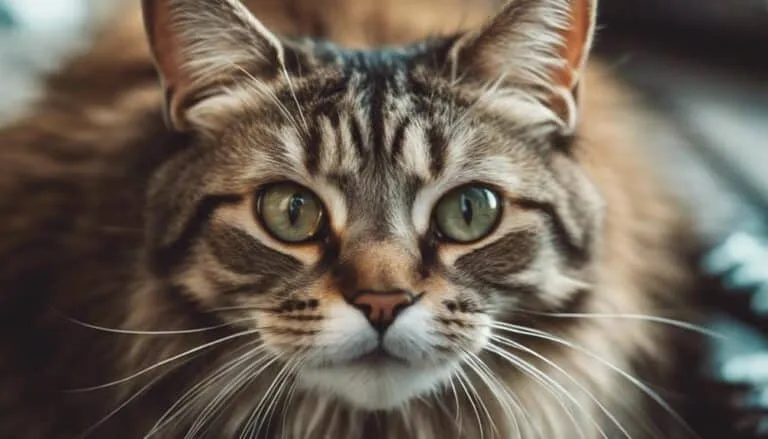The Best Fluffy Pancakes recipe you will fall in love with. Full of tips and tricks to help you make the best pancakes.

Thiamine deficiency may seem like an obscure topic, but its impact on the health and well-being of cats cannot be underestimated. This silent danger lurks in the shadows, often overlooked until it's too late.
As we explore the intricate web of causes, signs, and treatment options surrounding thiamine deficiency in cats, we uncover a world where a lack of this essential vitamin can lead to life-threatening consequences. Stay with us as we unravel the mysteries of this hidden danger, shedding light on the importance of early detection and intervention.
The lives of our feline companions depend on it.
Key Takeaways
- Thiamine deficiency in cats can be caused by gastrointestinal disorders, liver diseases, consumption of raw fish, or an imbalanced diet lacking thiamine.
- Signs of thiamine deficiency in cats include lack of appetite, vomiting, neurological abnormalities, muscle weakness, and seizures.
- Thiamine deficiency can be diagnosed through clinical signs, history, and various tests such as blood profile and urine analysis.
- Treatment for thiamine deficiency involves administration of injectable thiamine followed by oral supplementation, feeding a balanced diet, and limiting raw fish consumption. Veterinary guidance and regular monitoring are important for proper treatment.
Thiamine: The Essential Vitamin for Cats
Thiamine, an essential vitamin for cats, plays a crucial role in various physiological processes. These processes include carbohydrate metabolism, protein and fat breakdown, and the maintenance of muscle tone and overall growth. Cats, unlike some other animals, are unable to synthesize thiamine on their own. This makes it necessary for them to obtain this vital nutrient through their diet.
Thiamine deficiency in cats can lead to serious health consequences, including neurological disorders and even death. Supplementing thiamine in a cat's diet can provide numerous benefits. These benefits include improved energy production, enhanced digestion, and support for the nervous system. Thiamine supplementation can also help prevent thiamine deficiency in other animals, ensuring their overall health and well-being.
It is essential for cat owners to understand the importance of thiamine and ensure that their feline companions receive an adequate amount through their diet or supplementation. This will promote optimal health.
Causes of Thiamine Deficiency
Gastrointestinal disorders and liver diseases are common causes of thiamine deficiency in cats. Thiamine, also known as vitamin B1, is crucial for cats' overall health and well-being. Here are three key factors that contribute to thiamine deficiency:
- Inadequate dietary sources of thiamine: Cats require a diet that includes sufficient levels of thiamine to meet their nutritional needs. A diet lacking in thiamine or with low thiamine content can lead to deficiency over time.
- Long-term effects of thiamine deficiency: If left untreated, thiamine deficiency can have severe consequences. Neurological abnormalities, such as muscle weakness, tremors, and seizures, may occur. In severe cases, it can even result in life-threatening conditions.
- Over-processing of food: Thiamine is a sensitive vitamin that can be easily destroyed by over-processing of commercial cat food. Therefore, feeding a well-balanced and high-quality diet is crucial to prevent thiamine deficiency.
Understanding the causes of thiamine deficiency in cats is essential for ensuring their overall health and preventing the long-term effects of this deficiency.
Recognizing the Signs of Thiamine Deficiency
One of the key aspects of maintaining a cat's health is recognizing the signs of thiamine deficiency. Thiamine deficiency can have serious complications and long-term effects in cats if left untreated. It is important to be aware of the symptoms in order to seek prompt veterinary care.
Common signs of thiamine deficiency include lack of appetite, vomiting, cervical ventroflexion (bending the neck downward), dilated and fixed pupils, muscle weakness, tremors, unsteady gait, paralysis of the eye muscles, and seizures. These neurological abnormalities can progress rapidly and lead to life-threatening situations.
It is crucial to consult a veterinarian for proper diagnosis and treatment if thiamine deficiency is suspected. By recognizing the signs early on, cat owners can help prevent the complications and long-term effects associated with thiamine deficiency.
Diagnostic Tests for Thiamine Deficiency
To further investigate and confirm the presence of thiamine deficiency in cats, a series of diagnostic tests can be conducted by veterinarians. These tests are crucial for accurate diagnosis and to avoid misdiagnosis of other conditions with similar symptoms.
Here are three diagnostic tests commonly used:
- Biochemical blood profile: This test measures the levels of thiamine and other essential nutrients in the blood. A deficiency in thiamine can be detected through decreased levels.
- Complete blood count (CBC): The CBC test helps evaluate the overall health of the cat and can reveal abnormalities in red and white blood cells that may be associated with thiamine deficiency.
- Urine analysis: Thiamine deficiency can lead to urinary abnormalities. Analyzing the cat's urine can provide valuable information about kidney function and any potential thiamine-related issues.
These diagnostic tests, when combined with the evaluation of clinical signs and history, can accurately diagnose thiamine deficiency in cats and ensure appropriate treatment is administered.
Treating Thiamine Deficiency in Cats
Treatment for thiamine deficiency in cats typically involves the administration of injectable thiamine followed by oral supplementation. Injectable thiamine is given to rapidly replenish thiamine levels in the cat's body. This is followed by oral thiamine supplementation to maintain adequate levels over the long term.
It is essential to provide a well-balanced and high-quality diet to ensure sufficient thiamine intake. Raw fish consumption should be limited or suspended, as it can destroy thiamine. Veterinary guidance is crucial for the proper management of thiamine deficiency in cats.
Regular monitoring and follow-up are recommended to assess the cat's response to treatment and ensure thiamine levels are maintained within the optimal range. Prompt diagnosis and treatment are important to prevent the potential long-term effects of thiamine deficiency in cats.
Importance of a Balanced Diet for Thiamine
A balanced diet plays a crucial role in ensuring an adequate intake of thiamine for cats. The importance of a balanced diet for thiamine can be summarized in the following points:
- Prevention of thiamine deficiency risks: A well-balanced diet that includes thiamine-rich food sources helps prevent the development of thiamine deficiency in cats. By providing the necessary nutrients, a balanced diet supports overall health and ensures that cats receive sufficient thiamine to meet their daily requirements.
- Consequences of thiamine deficiency: Thiamine deficiency can have severe consequences for cats. It can lead to neurological abnormalities, including muscle weakness, tremors, and seizures. If left untreated, thiamine deficiency can be life-threatening. Therefore, a balanced diet that includes adequate levels of thiamine is essential for maintaining a cat's health and preventing the risks associated with thiamine deficiency.
- Overall well-being and vitality: A balanced diet not only provides the necessary thiamine but also supports the overall well-being and vitality of cats. It helps maintain healthy skin, fur, and eyes, supports proper growth, and ensures optimal functioning of the digestive tract and liver.
Preventing Thiamine Deficiency in Cats
In order to prevent thiamine deficiency in cats and ensure their overall health and well-being, it is crucial to focus on maintaining a balanced diet that provides an adequate intake of thiamine-rich food sources. Thiamine, also known as vitamin B1, plays a vital role in neurological health in cats.
Kittens are particularly susceptible to thiamine deficiency, as their growing bodies have higher thiamine requirements. To prevent thiamine deficiency in kittens, it is important to feed them a nutritionally complete and balanced diet specifically formulated for their age and developmental stage.
This diet should include high-quality protein sources, such as meat, poultry, or fish, as well as thiamine-fortified commercial cat food. Additionally, avoiding the feeding of raw fish, which can destroy thiamine, is essential.
Expert Insights on Thiamine Deficiency
Thiamine deficiency in cats can have serious consequences for their neurological health and overall well-being. It is important to understand the potential complications and long-term effects of thiamine deficiency to ensure the best care for our feline companions.
Expert insights on thiamine deficiency:
- Neurological complications: Thiamine deficiency can lead to neurological abnormalities such as cervical ventroflexion (bending the neck downward), muscle weakness, tremors, ataxia (unsteady gait), and paralysis of the eye muscles. These symptoms can severely impact a cat's quality of life if left untreated.
- Metabolic disturbances: Thiamine is involved in carbohydrate metabolism, and its deficiency can disrupt the normal process of transforming carbohydrates into glucose. This can lead to imbalances in energy metabolism and affect the overall health of the cat.
- Long-term effects: If thiamine deficiency is not addressed promptly, it can result in irreversible damage to the nervous system. This can lead to chronic neurological deficits and impairments in a cat's daily activities and overall well-being.
Understanding the potential complications and long-term effects of thiamine deficiency underscores the importance of early diagnosis and proper treatment to ensure the best outcome for our feline friends.
Stay Informed and Connected With Catster
Understanding the potential complications and long-term effects of thiamine deficiency in cats highlights the importance of staying informed and connected with Catster, a reliable source of information on cat health and well-being. Catster offers a subscription service that provides valuable updates and tips to ensure that cat owners are well-informed about the latest developments in feline health.
By subscribing to Catster, cat owners can stay connected with the latest news and articles related to cat health, including important information about thiamine deficiency and its prevention. Additionally, Catster emphasizes the importance of veterinary guidance in ensuring the proper treatment and management of thiamine deficiency in cats.
Conclusion
In conclusion, thiamine deficiency in cats is a serious and potentially life-threatening condition that should not be overlooked. It is essential for cat owners to be aware of the causes, signs, and diagnostic tests associated with thiamine deficiency.
Prompt treatment, under veterinary guidance, is crucial to ensure the well-being of feline companions. Additionally, maintaining a balanced diet that includes adequate thiamine is essential to prevent this deficiency.
Stay informed and connected with Catster to stay up-to-date on important information regarding thiamine deficiency in cats.








